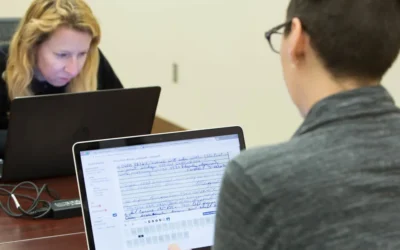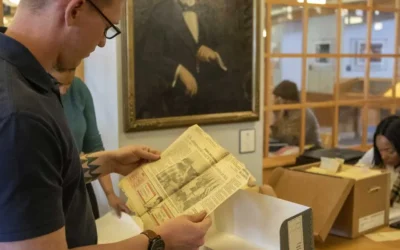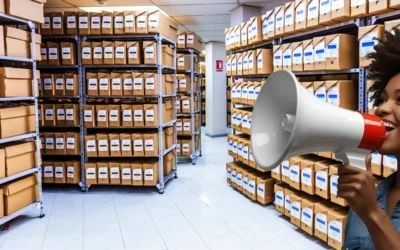Building a Purposeful Archives
Margot Note
Creating a collection development policy involves setting objectives that guide the growth and management of collections.
These objectives serve as the compass that directs the acquisition, preservation, and accessibility efforts of an archives. Archivists understand the importance of identifying collection development objectives and how they shape the purpose and direction of an archives.
Aligning with the Archival Mission
Collection development objectives should align closely with the mission statement of the archives. By establishing clear objectives, archivists ensure that every acquisition and preservation decision contributes to the overall purpose of the institution. Whether preserving local history, supporting scholarly research, or promoting cultural heritage, the objectives set the stage for building purposeful and impactful archives.
One significant objective of an archives may be to support educational and research endeavors. By identifying this objective, archivists can shape their collection development strategies to acquire materials that align with the academic interests of their intended audience. This may involve partnering with educational institutions, providing resources for student projects, or developing research-oriented collections that enrich scholarly pursuits.
Many archives have the objective of preserving and promoting cultural heritage. These archives serve as vital repositories of artifacts, documents, and records that reflect a particular group’s history, traditions, and values. By identifying cultural heritage preservation as a core objective, archivists can focus on acquiring materials that safeguard and celebrate the unique heritage of the archives’ audience.
Fostering Communities
Archives can play a significant role in fostering community engagement. By identifying community engagement as an objective, archivists can develop collection strategies that resonate with the interests and needs of the local community. This may involve organizing public exhibitions, hosting events, or seeking input in collection development decisions. Engaging the community creates a sense of ownership and connection with the archives’ collections.
One crucial objective for many archives is to ensure inclusivity and representation. Archives have the power to address historical gaps and amplify underrepresented voices. By identifying this objective, archivists can actively seek materials representing diverse perspectives, marginalized communities, and historically overlooked narratives. This objective encourages the acquisition of materials that challenge traditional narratives and provide a more comprehensive understanding of history and culture.
Archives can serve as catalysts for social change and advocacy. Archivists can actively acquire materials documenting social movements, human rights struggles, and historical transformative moments by identifying advocacy and social justice as collection development objectives. These collections provide a platform for education, awareness, and promoting social justice causes.
Balancing Quantity and Quality
An essential objective in collection development is to strike a balance between quantity and quality. While it may be tempting to acquire an extensive range of materials, it is equally essential to ensure that the materials meet specific quality standards and align with the objectives of the archives. Focus on acquiring historically significant, authentic, and relevant materials.
Identifying collection development objectives is vital in creating purposeful and impactful archives. By aligning with the archives’ mission, supporting educational and research endeavors, preserving cultural heritage, fostering community engagement, representing underrepresented voices, supporting advocacy, and balancing quantity and quality, archivists can shape their collection development strategies to reflect the institution’s core values and goals. These objectives provide a roadmap for acquiring, preserving, and providing access to materials that serve the target audience’s needs and make the archives a valuable resource for education, research, and social impact.
A Guiding Framework
Archivists play a crucial role in creating purposeful archives through the implementation of a well-defined collection development policy. This policy serves as a guiding framework that ensures the archives acquires materials that align with its mission and objectives. They establish criteria for evaluating potential acquisitions, considering factors such as historical significance, uniqueness, and relevance to the archives’ designated subject areas. The collection development policy also outlines the procedures for soliciting and accepting donations, as well as the protocols for appraising and selecting materials. Archivists engage in proactive outreach efforts to raise awareness about the archives and its collecting priorities, cultivating relationships with individuals, organizations, and communities that may possess valuable records. By adhering to a collection development policy, archivists ensure that the archives’ holdings are purposeful, representative, and reflective of the mission and values of the institution, while also enabling researchers and the public to engage meaningfully with the materials preserved within the archives.
Margot Note
Margot Note, archivist, consultant, and Lucidea Press author is a regular blogger, and popular webinar presenter for Lucidea, provider of ArchivEra, archival collections management software for today’s challenges and tomorrow’s opportunities. Read more of Margot’s posts here.
Never miss another post. Subscribe today!
Similar Posts
Collaborative Archival Relationships
Collaborative projects are instrumental in showcasing how archival collections can benefit various organizational departments.
Informational, Evidential, and Intrinsic Values within Archives
Archives provide authentic, reliable information and hold values that reflect their functions and uses; informational, evidential, and intrinsic.
A Sustainable Archives
Archivists prioritize sustainable practices and policies, rooting their work in ethics of care, often preferring digital processing and preservation
Archival Branding and PR Strategies
Archivists who adopt branding and PR strategies both safeguard historical treasures and contribute to their organizations’ evolution.




Leave a Comment
Comments are reviewed and must adhere to our comments policy.
0 Comments